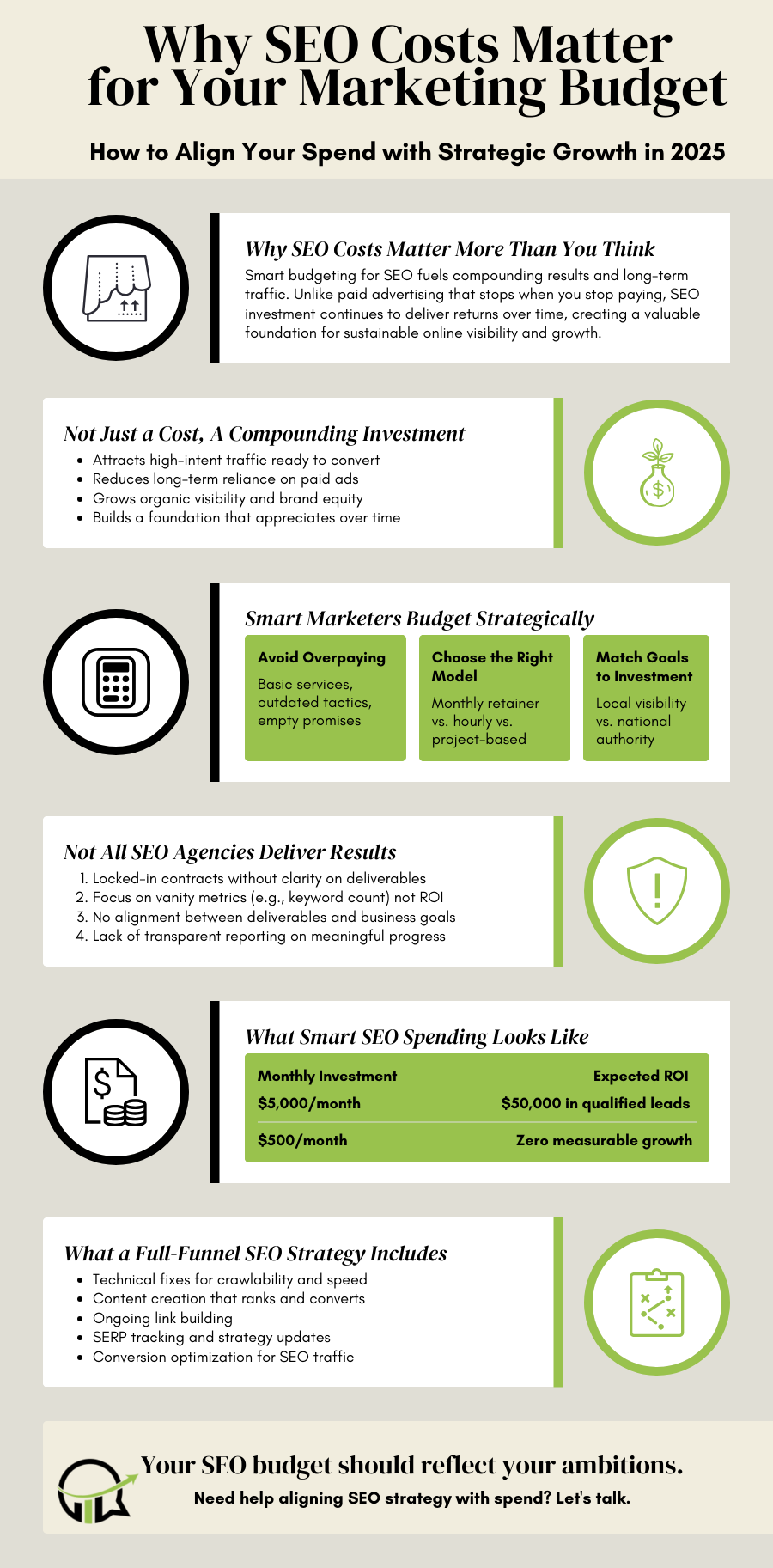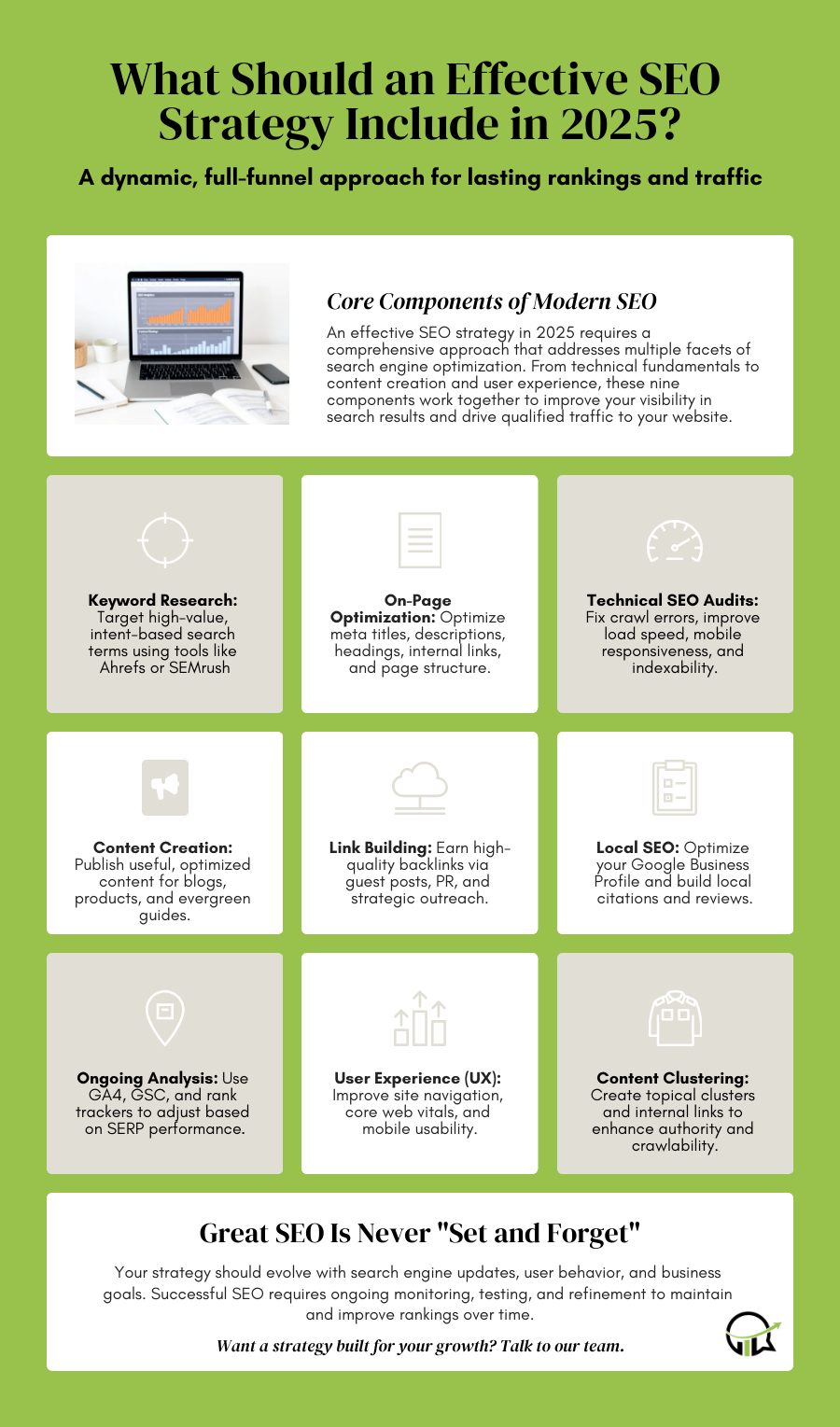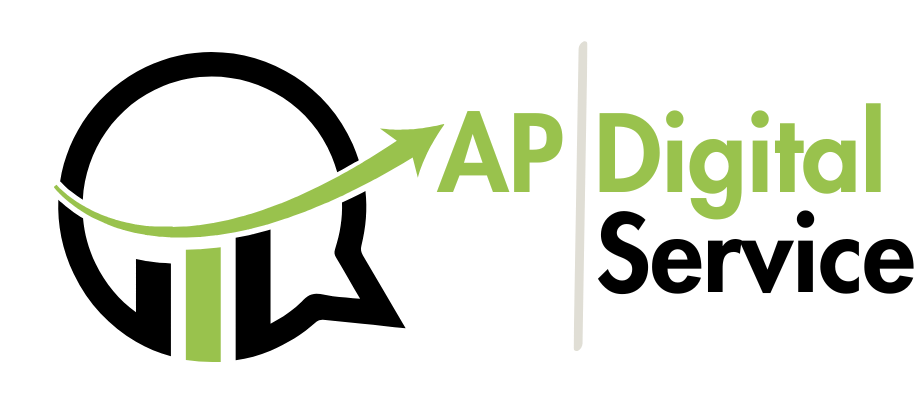How Much Does SEO Cost and Why: A Comprehensive Breakdown for 2025
TL;DR
- SEO pricing in 2025 ranges from $500 to $30,000+ per month, depending on your business size, goals, and website complexity.
- Pricing models include monthly retainers, hourly consulting, and one-time projects, with different models suited for different growth stages.
- An effective SEO strategy includes technical fixes, keyword targeting, content creation, and link building, all of which are adapted to your niche and goals.
- Small businesses can thrive with focused, local SEO, while national brands often require more advanced strategies and larger budgets.
- Authority and trust are critical ranking factors, built through consistent content, high-quality backlinks, and user experience.
- The most successful SEO investments prioritize clarity, strategy, and long-term outcomes, not short-term hacks or the cheapest package. (But it can happen the other way around...One of our clients turned a $2,500 investment into $45,000 in under 6 months.)
What Is SEO Pricing in 2025?
SEO pricing refers to how much businesses pay for search engine optimization services. In 2025, average SEO costs typically fall between $1,000 and $5,000 per month, but they can be as low as $100 for small tasks or $30,000+ for large-scale enterprise SEO campaigns.
The wide range in SEO pricing reflects the diversity of services offered and the goals of different businesses. A local hair salon might only need basic local SEO and content updates, while a national ecommerce brand may require a full technical audit, ongoing content marketing, link building, and platform-specific optimizations.
Key pricing tiers to consider:
- $100 to $1000/month: Ideal for basic local SEO, citation building, or maintenance on an existing strategy.
- $1,000 to $5,000/month: Common range for small to mid-sized businesses aiming for consistent organic growth with professional SEO support.
- $5,000 to $15,000/month: Suitable for companies in competitive markets needing custom strategies, frequent content creation, and aggressive link building.
- $15,000 to $30,000+/month: Enterprise-level SEO involving multiple stakeholders, global targeting, complex tech stacks, and multi-channel coordination.

These price points vary by the scope of the SEO strategy, the expertise of the provider, and the intensity of the competition in your niche. It's important to align your SEO budget with your business goals, website maturity, and long-term growth plans.
Why SEO Costs Matter for Your Marketing Budget
Knowing how much SEO costs and why helps you set a realistic and ROI-driven marketing budget. SEO is not just a line item, it's a strategic investment that compounds over time, attracting high-intent traffic and reducing reliance on paid ads.
If you're hiring an SEO agency, freelancer, or consultant, understanding what affects SEO costs can help you:
- Avoid overpaying for basic services that deliver little value or rely on outdated tactics
- Choose the right SEO pricing model based on your growth stage, campaign scope, and available resources
- Match your SEO investment to your revenue goals, whether you're looking for local visibility or national brand authority

Many SEO agencies offer tiered pricing, but not all deliver real results. Some may lock you into contracts without transparency or focus on vanity metrics instead of business outcomes.
Smart marketers allocate SEO budgets based on expected returns, not just price tags. A $5,000/month SEO investment that brings in $50,000 in qualified leads is a smarter spend than a $500/month plan that delivers no results.
The right budget supports a full-funnel SEO strategy that includes:
- Technical fixes that improve crawlability and speed
- High-quality content to rank and convert
- Ongoing link building and authority development
- SERP tracking and proactive strategy updates
In short, your SEO budget should reflect your ambitions. Underfunding SEO can stall your growth, overpaying without clear deliverables can burn your marketing dollars.

What Affects SEO Costs in 2025?
Several factors determine your SEO cost:
1. Business size and complexity
- A small local business may only need basic local SEO to appear in Google Maps or for a few local keywords.
- A national brand, SaaS platform, or ecommerce site may require a comprehensive, multi-faceted SEO strategy involving content teams, technical support, and international SEO.
- Larger businesses often require coordination across multiple departments and platforms, increasing the workload and cost.
2. Website structure and tech needs
- Websites with 100+ pages, custom codebases, or non-standard platforms often require more advanced technical SEO audits and implementations.
- Issues like slow page speed, broken links, crawl errors, and mobile usability problems can dramatically affect search engine rankings and require developer collaboration.
- Complex URL structures, navigation, and ecommerce filters often increase time and resources.
3. Competitiveness of keywords and industry
- In competitive industries like legal, finance, healthcare, and B2B SaaS, the SEO landscape is more saturated and requires higher investment in content and link building.
- Competitive keyword targets may need dozens of optimized pages and high-authority backlinks to outrank top competitors.
- Niche industries with long-tail keyword focus may see faster results with a lower investment.
4. Experience level of the SEO professional
- Freelancers with limited experience may charge less but offer fewer strategic insights or slower results.
- Mid-tier agencies often provide solid deliverables with a balance of cost and performance.
- Highly experienced SEO professionals or specialized agencies command premium rates but bring data-driven, results-focused strategies and often handle more complex challenges efficiently.
5. Your goals
- If you're aiming for local SEO visibility, your strategy may include citation building and Google Business Profile optimization.
- National rankings for high competition keywords may require more aggressive content marketing and link acquisition.
- Some businesses aim for brand awareness, others for conversion optimization. Each goal affects the scope, tools, and investment required.
These variables contribute to higher SEO costs or simpler monthly SEO packages. Understanding them ensures you set realistic expectations, avoid underinvesting, and align your SEO campaign with your business growth strategy.
What Are the Different SEO Pricing Models?
Understanding the different SEO pricing models helps you choose the right fit for your business goals, internal resources, and campaign needs. Here are the three most common options:
1. Monthly Retainer
This is the most popular model for businesses seeking long-term growth through ongoing SEO support.
- Pricing Range: $500 to $15,000+/month
- Best For: Businesses needing a full-service SEO strategy that includes technical optimization, content development, link building, and reporting
- Typical Inclusions:
- Keyword research and clustering
- Content creation and on-page SEO
- Technical SEO audits and fixes
- Authority building through link outreach
- Performance tracking and strategy adjustments
Retainers are ideal for companies that want continuous improvement and a proactive strategy. Most agencies offer tiered monthly SEO packages based on service depth and deliverables.
2. Hourly Rate
This model is often used for consulting, audits, or specific SEO tasks where the scope is smaller or unpredictable.
- Pricing Range: $50 to $250/hour
- Best For: One-off strategy calls, site reviews, or hands-on training
- Use Cases:
- Getting a second opinion on a migration
- Troubleshooting indexation or crawling issues
- SEO coaching or internal team training
Hourly SEO pricing can be cost-effective for smaller businesses or internal marketing teams that just need expert guidance.
3. Project-Based SEO
A one-time investment for a defined deliverable, project-based SEO is perfect for businesses with a specific goal or milestone.
- Pricing Range: $1,000 to $30,000+
- Best For: Website launches, SEO audits, content strategy development, or full redesigns
- Examples:
- Full technical SEO audit and roadmap
- Site architecture overhaul
- 6-month content strategy with topic clusters and briefs
Project pricing allows you to budget upfront and align expectations clearly. It's also a great way to "test drive" an agency before committing to a retainer.
How to Choose the Right SEO Agency
Not all SEO companies are created equal. Choosing the wrong provider can lead to wasted budgets, poor performance, and a long road to recovery.
Here’s what to look for when evaluating SEO firms or consultants:
- Proven track record with similar businesses
- Look for case studies, performance reports, or documented results in your industry or business model.
- Ask for specific examples of keyword rankings, traffic growth, or revenue impact.
- Transparent SEO pricing packages and deliverables
- Avoid vague promises. You should know what you're paying for each month.
- The best SEO agencies provide clear scopes, timelines, and responsibilities.
- Customized SEO strategies, not cookie-cutter plans
- Your business is unique; your SEO strategy should be too.
- Ask how they tailor strategies for local SEO, ecommerce SEO, or content-heavy brands.
- Client reviews and testimonials
- Check platforms like Google Reviews and LinkedIn.
- Ask for references or the chance to speak with a current or past client.
- Regular reporting and clear KPIs
- Expect monthly reports on traffic, keyword rankings, technical fixes, and links earned.
- Ask how they measure SEO performance: are they focused on real business metrics like leads and revenue, not just vanity traffic?

Bonus tip: Interview more than one SEO agency. Compare their processes, pricing models, and how well they understand your goals.
Hiring the right SEO agency or SEO consultant can make or break your campaign. Avoid cheap SEO packages that promise "#1 rankings fast." Focus on strategic partners who are transparent, data-driven, and aligned with your long-term business vision.
What Should an Effective SEO Strategy Include?
An effective SEO strategy is not just a checklist; it’s a living, adaptive system that evolves with your industry, audience, and algorithm changes. Whether you’re investing in local visibility or aiming to dominate national rankings, your SEO strategy should be comprehensive and customized.
Here are the core components of a high-performing SEO strategy:
- Keyword Research: Identify high-value terms that your target audience is actually searching for. Use intent-based segmentation (informational, transactional, navigational) and tools like Ahrefs, SEMrush, or Google Search Console to find and prioritize keywords that convert.
- On-Page Optimization: This includes optimizing meta titles, meta descriptions, headings (H1-H3), internal linking, image alt text, and structured data. Each page should have a clear target keyword, relevant secondary terms, and a logical, user-friendly layout.
- Technical SEO Audits: Ensure your site loads fast, is mobile-friendly, and can be crawled and indexed by search engines. This involves fixing broken links, optimizing page speed, cleaning up code, creating XML sitemaps, and managing redirects and crawl errors.
- Content Creation: High-quality, helpful, and optimized content is the engine of organic growth. Your strategy should include blog posts, product pages, landing pages, and evergreen guides that are mapped to user intent. Content should be structured for readability, optimized for featured snippets, and updated regularly.
- Link Building: Acquiring authoritative and relevant backlinks helps build domain authority. Use a mix of guest posting, digital PR, content promotion, and partnerships to earn quality links. Avoid black-hat tactics that could lead to penalties.
- Local SEO: For businesses targeting a specific geographic area and optimize your Google Business Profile. Include local citations, local keyword targeting, reviews, and localized content to rank in the local map results on Google.
- Ongoing Analysis and Iteration: SEO is never “done.” Monitor performance using tools like Google Analytics, Search Console, and third-party rank trackers. Regularly evaluate what’s working, what needs improvement, and how to pivot based on changes in the SERPs or business priorities.
- User Experience (UX): Increasingly, search engines factor in UX signals like dwell time, bounce rate, and core web vitals. Your SEO strategy should include UX audits to improve site navigation, mobile usability, and content accessibility.
- Content Clustering and Internal Linking: Create topical clusters around pillar content and link related pages together. This improves crawlability, enhances topical authority, and boosts performance in competition.
The best SEO services adapt your strategy over time based on your search engine rankings, business goals, and evolving market conditions. It should be proactive, data-driven, and built for both search engines and real people.

What Search Engine Optimization Services Are Included?
When evaluating SEO providers, it's essential to understand what services are actually included in your plan. Not all agencies or consultants offer the same scope of work, and vague deliverables can lead to mismatched expectations and underwhelming results.

Most SEO providers offer a mix of the following core services:
- Content Creation and Optimization
- Writing and optimizing blog posts, service pages, landing pages, and product descriptions
- Ensuring keyword usage, internal links, and content formatting align with SEO best practices
- Updating outdated content to reflect current trends and algorithm updates
- Link Building and Outreach
- Securing backlinks from authoritative websites in your industry
- Performing manual outreach, guest posting, and digital PR campaigns
- Monitoring backlink profiles to disavow toxic or spammy links
- Technical SEO and Audits
- Conducting regular site audits to identify crawl errors, speed issues, and mobile usability problems
- Implementing structured data, fixing broken links, and improving Core Web Vitals
- Collaborating with developers to resolve deeper technical issues
- Local SEO Efforts
- Google Business Profile optimization, including accurate business details and photos
- Building and managing local citations across directories
- Encouraging and responding to customer reviews to boost local trust and visibility
- Ecommerce SEO
- Optimizing category and product pages for search intent and usability
- Managing large inventories with canonical tags, schema markup, and faceted navigation control
- Developing content strategies for product education and conversion support
Additional services may include:
- SEO Reporting and Analytics: Customized dashboards, keyword tracking, traffic and conversion analysis
- Conversion Rate Optimization (CRO): Improving site layouts and CTAs to turn traffic into leads or sales
- Competitor Analysis: Benchmarking your site against key competitors and identifying content gaps
Ask for what’s clearly included in your monthly SEO services or SEO pricing packages. Some agencies offer all-in-one packages, while others bill each component separately. Always confirm whether deliverables include strategy development, implementation, reporting, or just recommendations.
How Do Local SEO and Organic Search Work Together?
Local SEO and organic search serve different but complementary roles in a modern SEO strategy. Understanding how they intersect can help you tailor your SEO investment based on location, audience behavior, and your business model.
- Local SEO is all about increasing visibility in location-based searches, such as "coffee shop near me" or "best dentist in Austin." It leverages tools like Google Business Profile, local citations, and review generation to help brick-and-mortar or service-area businesses appear in the "local pack" and map results.
- Organic Search SEO, on the other hand, focuses on ranking for non-location-specific queries. This includes national or global searches like "how to write a business plan" or "best CRM for remote teams." It relies on high-quality content, backlinks, and technical SEO to earn positions in the standard search results.
Real-World Examples:
- If a local bakery wants to rank for "best bakery near me," its SEO strategy should emphasize local listings, reviews, and mobile-friendly design.
- A
SaaS company targeting "best CRM for small teams" needs a content-heavy strategy with blog posts, landing pages, and link building to establish national relevance.
Why They Work Better Together:
- Local SEO often converts faster because searchers have high intent (e.g., finding a service nearby right now).
- Organic SEO builds long-term visibility and brand authority at scale, driving traffic beyond your immediate area.
Many SEO agencies offer hybrid SEO packages that include both local and organic elements. This is especially useful for service businesses with multiple locations, ecommerce brands with a local presence, or content creators looking to drive both foot traffic and digital leads.
What Should You Know About Your SEO Budget?
Your SEO budget should reflect a blend of your business goals, internal capabilities, market conditions, and competitive landscape. Rather than viewing SEO as a fixed cost, think of it as a strategic investment in future growth.
Your SEO budget should consider:
- Revenue goals: Are you looking to generate more leads, increase ecommerce sales, or reduce paid ad spend? Your SEO spend should align with your desired return on investment.
- Competition: High-competition industries require larger budgets to compete for valuable search terms and build authoritative link profiles.
- Internal resources: If you have an in-house content team or developers, you might reduce outsourcing costs. Otherwise, your budget should include room for external support.
- Tools and tech stack: Premium SEO tools like Ahrefs, SEMrush, Screaming Frog, or Surfer SEO typically cost $100-$500/month each and should be factored into your overall investment.
Typical SEO budget ranges:
- $500 to $3,000/month: Ideal for small-scale SEO, such as local businesses or basic content optimization
- $3,000 to $10,000+/month: Best for more complex SEO strategies involving technical fixes, regular content production, and aggressive link building
- Additional costs: Plan for one-time projects (audits, migrations), tool subscriptions, and occasional third-party services like copywriting or PR outreach
Remember, SEO success doesn’t come from under-spending. Cutting corners leads to low-quality content, poor link profiles, and little ROI. Similarly, overspending on bloated services without a clear strategy can drain your budget.
The most effective approach is to treat SEO as an ongoing investment, one that delivers cumulative gains over time, improves brand visibility, and builds marketing resilience against paid traffic volatility.

What Does an SEO Specialist Actually Do?
An SEO specialist is more than just a technician; they act as a strategist, analyst, and execution partner who works to grow your organic visibility and revenue. Their role bridges the gap between what search engines want and what your audience needs.
Here’s what a skilled SEO professional typically handles:
- Keyword Research and Clustering
- Identifies short- and long-tail keywords that align with your business goals
- Groups keywords into clusters for content planning and internal linking
- Technical SEO Implementation
- Optimizes site speed, mobile usability, crawl depth, and indexation
- Audits site architecture and recommends fixes for broken links, duplicate content, or poor Core Web Vitals
- On-Page Content Optimization
- Edits or creates meta titles, descriptions, headers, and body content
- Ensures each page is properly structured, keyword-aligned, and user-friendly
- Link Acquisition Campaigns
- Develops backlink strategies through guest posting, digital PR, and outreach
- Audits existing backlinks to remove toxic links and improve domain authority
- SERP Tracking and Adjustments
- Monitors keyword rankings, traffic shifts, and algorithm updates
- Uses data to revise strategies, prioritize new opportunities, and protect gains
- Collaboration with Content and Dev Teams
- Works with writers to create optimized, high-performing content
- Coordinates with developers to implement technical changes without harming UX
- Reporting and ROI Analysis
- Builds reports that track KPIs like rankings, traffic, conversions, and revenue impact
- Communicates insights and next steps clearly to stakeholders
Why Link Building and Content Matter Most

Link building and content creation are the backbone of long-term SEO performance. While technical SEO ensures your site can be crawled and indexed, content and links are what drive rankings, traffic, and authority.
- High-quality backlinks build authority
- Search engines view backlinks as votes of confidence. Earning links from reputable sites signals that your content is trustworthy and valuable.
- The more relevant, high-authority backlinks you earn, the more likely you are to rank for competitive keywords.
- Link acquisition isn't just about volume; it's about relevance, context, and the quality of the referring domain.
- Engaging, optimized content attracts both users and links
- Great content solves problems, answers questions, and earns natural backlinks from other websites.
- Content includes blogs, guides, videos, tools, and case studies, all designed to educate, entertain, or convert.
- Well-structured content increases dwell time, reduces bounce rates, and positions your site as a topical authority.
Together, content and link building form a powerful flywheel. Great content earns links, and great links improve rankings, which brings in more traffic that engages with and shares your content. This compounding effect is what makes SEO such a high-leverage channel.
A successful SEO campaign balances these two forces. Ignoring one weakens the other. That's why the best SEO strategies invest in both original, helpful content and ethical, consistent link-building efforts.
How Do Search Engines Rank Your Site?
Search engines like Google use complex algorithms to evaluate and rank webpages based on hundreds of signals. The core pillars of the formula remain consistent:
- Relevance (Does your content match the user’s query?)
- Search engines look for precise keyword alignment, semantic context, and topical depth.
- Proper use of headings, metadata, and structured content helps Google understand the topic.
- Authority (Does your website have credibility and trustworthiness?)
- Backlinks from other authoritative websites act as endorsements.
- Domain age, content history, and author expertise also influence perceived authority.
- User Experience (UX) (Is your site fast, accessible, and easy to navigate?)
- Core Web Vitals (LCP, FID, CLS), mobile responsiveness, and site structure all contribute to this.
- Clean design, fast load times, and intuitive navigation improve engagement metrics like dwell time and bounce rate.
- Freshness and Frequency
- Updated content signals ongoing relevance, especially for time-sensitive topics.
- Engagement Metrics
- While Google doesn’t confirm all behavioral signals, low bounce rates, high time-on-site, and strong click-through rates suggest quality to algorithms.
Understanding how search engines rank your site empowers you to build a more effective SEO strategy. The best-performing websites consistently publish relevant content, earn quality backlinks, and deliver great user experiences that align with search intent.
What Do SEO Services Look Like for Small Businesses?
Small businesses need cost-effective, locally focused SEO strategies that prioritize ROI and immediate impact. Unlike enterprise-level SEO, which often involves broad keyword targeting and complex campaigns, small business SEO is about visibility in the community, lead generation, and foot traffic.
Here’s what smart, small-scale SEO typically includes:
- Optimize Google Business Profile (GBP)
- Ensure your profile is complete with accurate contact info, business hours, services, and photos.
- Regularly post updates, respond to reviews, and use relevant keywords in descriptions.
- Build Local Citations
- List your business in relevant directories like Yelp, Yellow Pages, and local chambers of commerce.
- Maintain NAP (Name, Address, Phone) consistency across all platforms
- Review Generation and Management
- Implement strategies to gather genuine customer reviews
- Monitor and respond to reviews to show credibility and improve local SEO rankings
- Location-Based Keyword Targeting
- Use geo-modified keywords like “plumber in Denver” to attract local searches.
- Create city or neighborhood landing pages to improve local relevance
- Local Link Building
- Earn links from community blogs, local news sites, and business associations.
- Sponsor local events or collaborate with nearby businesses for cross-promotion
- Basic On-Page Optimization
- Ensure your website has optimized meta tags, schema markup for local business, and a mobile-friendly design.
- Performance Tracking
- Set up and monitor local keyword rankings, Google Search Console, and GBP insights.
Small-scale SEO doesn’t mean low quality; it means intelligent prioritization within your SEO budget. The goal is to focus on high-impact activities that move the needle in your specific market.
The best SEO providers for small businesses offer flexible pricing, local expertise, and clear communication. They should help you show up on maps, win trust from local customers, and build a sustainable digital presence.
What Role Do Authority and Trust Play in SEO?
Authority and trust are two of the most critical signals Google uses to evaluate websites. The more trustworthy and authoritative your site appears, the more likely it is to rank well across a variety of search queries.
Search engines aim to deliver the best possible experience to users, and that includes promoting content that is:
- Credible and original
- Expertly written and fact-checked
- Backed by reputable sources and citations
Here’s how to build and sustain both authority and trust:
- Publish original, helpful content
- Focus on depth, clarity, and usefulness. Go beyond surface-level tips and include personal experience, data, or expert interviews.
- Regularly update existing content to reflect the latest standards, trends, and information.
- Build relevant, high-quality backlinks
- Links from other trusted, contextually relevant websites signal credibility to Google.
- Digital PR, guest blogging, and outreach campaigns are effective ways to earn authoritative links.
- Demonstrate E-E-A-T (Experience, Expertise, Authoritativeness, and Trustworthiness)
- Add author bios, credentials, and references to content where appropriate.
- Highlight real-world experience, case studies, and customer testimonials.
- Avoid spammy or manipulative tactics
- Practices like keyword stuffing, buying links, or auto-generated content can damage your trust profile and trigger penalties.
A good SEO agency doesn’t just chase rankings; it helps you build an online reputation that mirrors your authority in real life. This approach leads to sustainable growth and protects your rankings from algorithm updates that target low-quality content and manipulative SEO tactics.
FAQ
How much does SEO cost in 2025?
SEO costs range from $500 to $30,000+ per month, depending on your goals, competition, and the SEO provider.
Are SEO services worth the investment?
Yes, SEO is one of the highest ROI digital channels when executed correctly. It compounds over time.
What’s included in SEO services?
Typical SEO packages include keyword research, technical audits, on-page optimization, content creation, and link building.

Final Thoughts:
What Should You Expect From SEO Costs in 2025?
SEO pricing in 2025 depends on your business size, goals, and website complexity. It’s not about finding the cheapest SEO services; it’s about finding the right strategy and partner for your growth stage.
We often see business owners treat SEO as a cost rather than an investment. When they don’t see immediate returns, they give up too soon, or they buy the lowest-tier package and expect top-tier results. This disconnect usually comes from a lack of clear communication. Most agencies fail to explain what clients are actually paying for or how it maps to real business goals.
That’s why we prioritize clarity from day one. When your SEO partner truly understands your direction and can translate strategy into plain language, you can set smart expectations and build momentum that compounds over time.
Case in point: one client was hesitant to spend $2,500 on SEO. Less than six months later, they brought in over $45,000 from that investment, a 1700% ROI. That’s the power of a clear plan, consistent execution, and long-term thinking.
Whether you're investing in monthly SEO services, a one-time audit, or ongoing content and link building, choose an experienced SEO agency that aligns with your business stage and strategy.
If sustainable business growth beyond social media is your next chapter, apply now to review partnership options.












